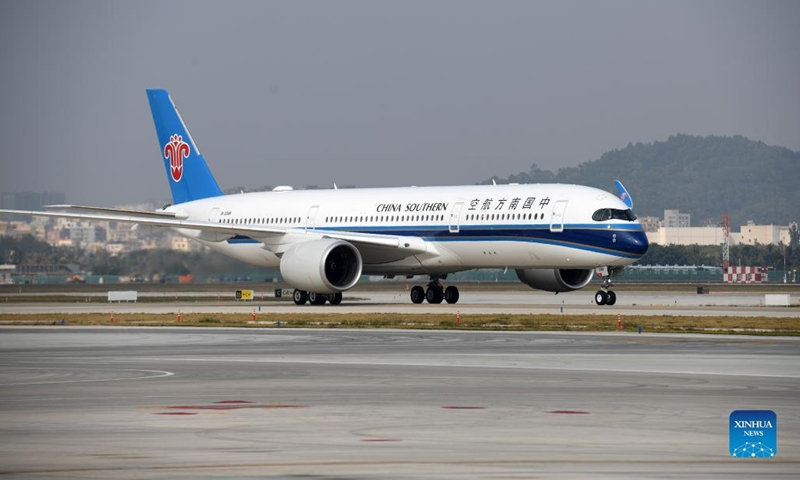
An Airbus A350-900 arrives at the Baoan International Airport in Shenzhen, south China's Guangdong Province, Jan. 6, 2022. (Photo: Xinhua)
The deals signed by China's three biggest airlines to purchase nearly 300 planes from Europe-based Airbus has apparently dealt a blow to US planemaker Boeing, which responded to the new contracts by saying that "geopolitical differences" are constraining its exports and calling for "productive dialogue" between Chinese and US governments.
Analysts noted that Chinese airlines' cooperation with Boeing and Airbus has remained generally balanced, but the two devastating plane crashes involving B737 Max have undermined market confidence in the US aircraft manufacturer. Moreover, the US government's increasing crackdowns on Chinese companies also pose serious challenges and risks for bilateral business cooperation, analysts pointed out.
China's three biggest state-owned airlines signed deals to buy 292 A320neo planes worth a total of $37 billion from European aircraft manufacturer Airbus, marking the first time in almost three years that Chinese carriers announced deals of this scale. The airlines said that the new orders, which are expected to be delivered from 2024 to 2027, will help increase their flying capacity and meet replacement needs as older aircraft are retired.
"These new orders demonstrate the strong confidence in Airbus from our customers. It is also a solid endorsement from our airline customers in China of the performance, quality, fuel efficiency and sustainability of the world's leading family of single aisle aircraft," Christian Scherer, Airbus Chief Commercial Officer and Head of International, said in a statement on the company's website.
In stark contrast, Boeing expressed disappointment in a statement. "As a top US exporter with a 50-year relationship with China's aviation industry, it is disappointing that geopolitical differences continue to constrain US aircraft exports," Boeing said on Friday. "We continue to urge a productive dialogue between the governments given the mutual economic benefits of a thriving aviation industry. Boeing aircraft sales to China historically support tens of thousands of American jobs, and we are hopeful orders and deliveries will resume promptly."
Boeing, the main competitor to Airbus, has struggled to win big orders from China in recent years. The last large deal was in November 2017 when China signed a purchase deal with Boeing for 300 aircraft also worth $37 billion. Since then, Sino-US relations have become more complicated with Washington's push for a so-called economic decouple, while two fatal incidents involving Boeing aircraft have also shaken market confidence.
Boeing's best-selling B737 Max has so far failed to return to service in China and has not received any new orders. There have been some small orders, such as in May 2022, when China Eastern said it would acquire 38 aircraft, including four Boeing 787s.
The US has been imposing sanctions on various areas, including the maintenance and repair of Boeing aircraft, and there are big problems when it comes to safe operation of equipment, which will actually greatly affect the reliability and stability of Boeing's aircraft services, and this is an important concern for the airlines when buying planes, Lin Zhijie, an independent market watcher, told the Global Times on Sunday.
Cui Hongjian, director of the Department of European Studies at the China Institute of International Studies, also noted that China-US bilateral economic and trade ties have seen accelerating deterioration due to Washington's hegemonic mindset.
"It is not beyond comprehension if Chinese airlines' preference for Boeing has cooled given that the US government continues wielding its hegemonic stick to bully Chinese companies," Cui told the Global Times on Sunday, adding that the new deals are "good news" for the European economy battered by the COVID-19 pandemic.
Cui also urged that the mutually beneficial China-Europe relationship should be further enhanced, noting that China and Europe have formed a solid cooperative foundation in the civil aviation industry.
Airbus told the Global Times that the in-service fleet in China now has a market share of 53 percent, up from 9 percent in1995. "By the end of May 2022, the in-service Airbus fleet with Chinese operators totaled over 2,070 aircraft," it said.




